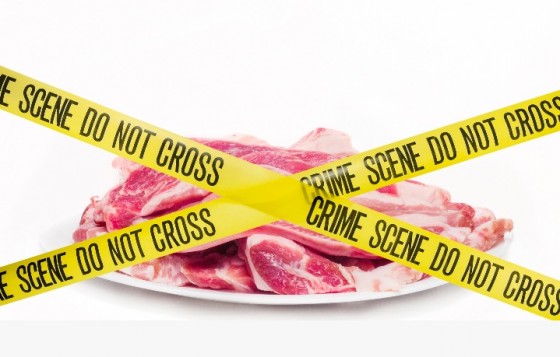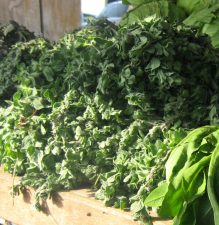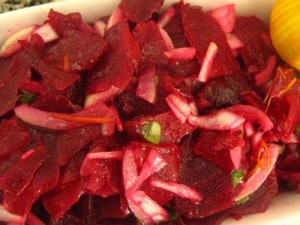 I grew up eating horsemeat. It was considered a treat –– a Dutch delicacy. Maybe once every four or five months my dad would come home with half a pound of it wrapped in waxed paper from the Dutch store. It was sliced thin, like prosciutto. Salty and delicate it almost melted in my mouth. This paardenrookvlees was expensive and I am not sure that’s the reason why we didn’t eat it more often. I wasn’t sentimental about it, and enjoyed it when it was there. We ate it on a slice of buttered white bread the same way we’d eat chocolate shavings on bread, the old Dutch way. Or we’d just pop a piece into our mouths.
I grew up eating horsemeat. It was considered a treat –– a Dutch delicacy. Maybe once every four or five months my dad would come home with half a pound of it wrapped in waxed paper from the Dutch store. It was sliced thin, like prosciutto. Salty and delicate it almost melted in my mouth. This paardenrookvlees was expensive and I am not sure that’s the reason why we didn’t eat it more often. I wasn’t sentimental about it, and enjoyed it when it was there. We ate it on a slice of buttered white bread the same way we’d eat chocolate shavings on bread, the old Dutch way. Or we’d just pop a piece into our mouths.
It is scandalous when people buy something and then are lied to and given another product. But I am not surprised over the horsemeat headlines in Europe and North America: people have become too far removed from what they eat.
As a former horsemeat eater, it’s no big deal to hear the news that there is horsemeat in Swedish meatballs. But I do blame consumers for the scandal: When you go to the grocery store you see plainly that the amount of packaged food far outweighs fresh produce, deli items and basic things like cheese. Don’t you see that this is something wrong?
Most of the packaged and frozen food at the grocery store are just things you can make yourself.
Who needs a dozen kinds of pretzels, one hundred or more kinds of cereals, a hundred kids of bread, fifty kinds of granola bars? Hundred and hundreds of packaged and bottled sauces, isles and isles of frozen foods?
Years ago when I was a kid the only kind of frozen dinner you could buy was a TV dinner or fish sticks. And that for my parents was something we reserved for when they were going out for the night.
Now frozen dinners have become the norm. They have swapped places with regular home cooked meals. This means our families are getting poorer quality food, with important local ingredients gone –– including the most important one, love, missing.
Instead of preparing food, everything has become easy: buy some pre-made cookie mix or partially baked bread. Pop it in the oven and voila – a homecooked meal.
I think if I were going to be in an uproar over the horsemeat scandal I’d be adding to the list all the different kinds of chemicals and additives that make their way into our food as well.
My solution: people should become more religious about their food.
If you look at religious groups, let’s say the Jews, they are constantly scanning, checking, and monitoring their meat sources.
Kosher beef comes from kosher animals that have no wounds, and which are in sound health. They are slaughtered in a very specific way, and the blood from the animal is drained. Jews are constantly checking what’s in their food on religious grounds. Jews cannot for instance eat milk and meat together in any circumstance, except perhaps for medical reasons.
There is no better example of stringency towards food in the Jewish community as now, during the days before Passover when a whole pile of food laws and regulations come into effect. Thanks to the old story of escaping slavery in Egypt, and not having enough time to leaven their bread, Jews do not eat leavened bread on Passover. They are even forbidden from seeing it.
Religious Jews in Israel have now gone so far as to get one of their main water sources from the Sea of Galilee cut off during Passover. The argument goes that if someone drops a piece of bread into the lake during Passover, the entire public’s drinking water will be contaminated –– even if in homeopathic amounts.
This idea hasn’t extended to the amount of chemicals Jews are allowed in their food, but a religious or halachic approach to cleaning and organizing food is a good model on how we can treat that which goes into our homes and bodies.
The most devout Jews will eat meat from slaughterers and butchers who they know. I have friends whose parents have never eaten at a restaurant, even extremely religiously supervised ones. They won’t eat in them because they don’t trust the source of the food.
For this reason my husband’s Jewish grandmother would make her own kosher wine every year for Passover. Also in Islam, and Hinduism, we find societies of people that care about what goes into and what doesn’t go into their food.
Now you, whether you have moral, health, or ecological reasons –– take a look at religion to see how food is handled and consumed. With more interest in food traditions you might find fewer surprises waiting for you at the supermarket.
Whole animal eating
Making food at home is something you can engage your kids in before it’s too late. Before they are lost forever in their video games and smart phones. Forget blaming the government and the stores and the suppliers for horsemeat and prepare your own healthy food at home.
If you want to know exactly where your meat is coming from, go to a farm and buy a whole animal that can then be packaged and stored in your freezer. Or hunt. This is what men do in Northern Ontario. They organize hunts and then divvy up the moose and dear meat. It’s a great staple in cash-strapped communities.
Be outraged over the horsemeat scandal. But do something about it. Be more religious in your own way about your meat. Skip the frozen food isle and head to the meat counter. Ask where your meat comes from. Get it ground in front of eyes. Prepare food and freeze it yourself so you can still enjoy those quickie meals midweek and stop freaking out about what’s being put into your food, as if you have no say in the matter.




What I miss most about “TV dinners” are the folding tables we used to have to be able watch our favorite program while eating. I wonder if original ones can be bought on EBay?
Frozen food as a way of life is bad on so many levels, not to mention the health aspects. Think of all the plastics, and energy needed to keep that stuff cold in the store, and in transport. Sorry I won’t buy into the argument that people after one generation no longer know how to cook. Pick up the phone, and call your grandma or someone’s grandma and learn.
In light of the Adom Adom animal cruelty and abuse scandal in northern Israel, as well as some issues involving kosher meat processing plants in the USA, kosher meat slaughterhouses are not always as one might think they are. When you get the finished product at the supermarket or butcher, who knows how that meat was actually “processed” – especially at the slaughterhouse itself.
I think the companies are to blame for lying about what they put in the food and if by accident they need better quality control. also not everyone knows how to cook especially lasagna. some people dont have the time or energy to cook. why blame the consumer.. frozen food can be healthy too.
The horses only want to graze freely, which they did until we corralled them for cattle ranching, racing, circuses and now slaughter. I became a vegetarian when a documentary showed how the cattle are slaughtered assembly line style, now the horses too I imagine. Besides, most vegetarians live healthier and longer lives.
The idea here is to scrutinize your meat sources, and to make more food at home.
well you’ve convinced me: caring about what you eat is usually code for neurotically caring too much about what you eat, while everyone else puts up with your whining and ranting. or was there supposed to be another point here?